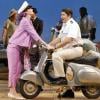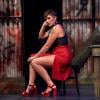
A peak experience at the opera comes with a moment of transfiguration.
Near the end of the San Francisco Opera Adler Fellows’ “The Future Is Now” concert on Saturday night, that moment came as the walls of Herbst Theatre disappeared and we found ourselves in Carthage some 3,000 mythical years ago.
Here, mezzo-soprano Gabrielle Beteag appeared as the despairing Queen Dido, learning of her betrayal by Aeneas. In Hector Berlioz’s Les Troyens, she is devastated by shock and grief: “Je vais mourir ... Adieu, fière cité” (I’m going to die ... Farewell, proud city).
Dido — no, Beteag — conveyed the sense of overwhelming tragedy without exaggeration or theatricality. Her precise, soaring voice filled the hall but without the oversinging that’s so easy and tempting in this singer-friendly space.
Previously led by SF Opera Music Director Eun Sun Kim, the Adler Fellows concert was conducted this year by Ramón Tebar, who is also making his company debut in L’elisir d’amore, which runs through Dec. 9.

Beteag, five other singers, and pianist/coach Marika Yasuda are leaving the program, so they took risks. Tenor Moisés Salazar bid farewell with a clarion “Nessun dorma” from Puccini’s Turandot.
Besides Dido, Beteag sang the role of Adalgisa in a scene from Vincenzo Bellini’s Norma, with Salazar as Pollione. She also performed the silent role of the Old Baroness in a scene from Samuel Barber’s Vanessa, knitting wordlessly, which must be hard for a singer.
Also departing the program is tenor Edward Graves, who sang the role of Anatol in Vanessa, the aria “Amor ti vieta” from Umberto Giordano’s Fedora, the Duke of Mantua in the quartet from Verdi’s Rigoletto, and Hervey in an extended scene from Gaetano Donizetti’s Anna Bolena.
Tenor Victor Cardamone marked the end of his Adler years with the aria “Sometimes th’ pain of missin’ him” from Carlisle Floyd’s Cold Sassy Tree, in the role of Iopas in the Les Troyens scene, and as Percy in Anna Bolena. Departing soprano Mikayla Sager sang Leonora in a scene from Verdi’s Il trovatore and the title role in the Anna Bolena excerpt.

They and the continuing Adler Fellows — sopranos Arianna Rodriguez and Olivia Smith, mezzo-soprano Nikola Printz, bass-baritone Jongwon Han, and pianist/coach Yang Lin — all participated in the concert-closing scene from Puccini’s La rondine. When the returning fellows go to work next year, they will be joined by six new appointees.
Printz was another standout on Saturday, singing the aria “I was a woman” from David Lang’s prisoner of the state and acting with distinction through a variety of roles, including Erika in Vanessa, Maddalena in Rigoletto, and Anna in Les Troyens.
And now, an overview: SF Opera’s training programs are integral to the company’s 101-year history, established earlier and at a larger size than any similar program in the U.S.
After decades of informally coaching and training singers, SF Opera’s second general director, Kurt Herbert Adler (1953–1981), honored his predecessor, Gaetano Merola (1923–1953), with the establishment of the Merola Opera Program in 1957.
Adler himself was honored by Terence McEwen (1982–1988), who renamed the Affiliate Artists Program, created in 1977, as the Adler Fellowship Program. McEwen also established the SF Opera Center, which coordinates educational and training programs.

The “Future Is Now” showcase began in 2004, when Pamela Rosenberg (2001–2005) was general director.
Adler Fellows are trained in musical technique and preparation, foreign-language skills, and acting technique and movement, as well as financial management, leadership development, mental and emotional resilience, and other skills necessary for a musical career. They also have roles in SF Opera’s mainstage productions.




